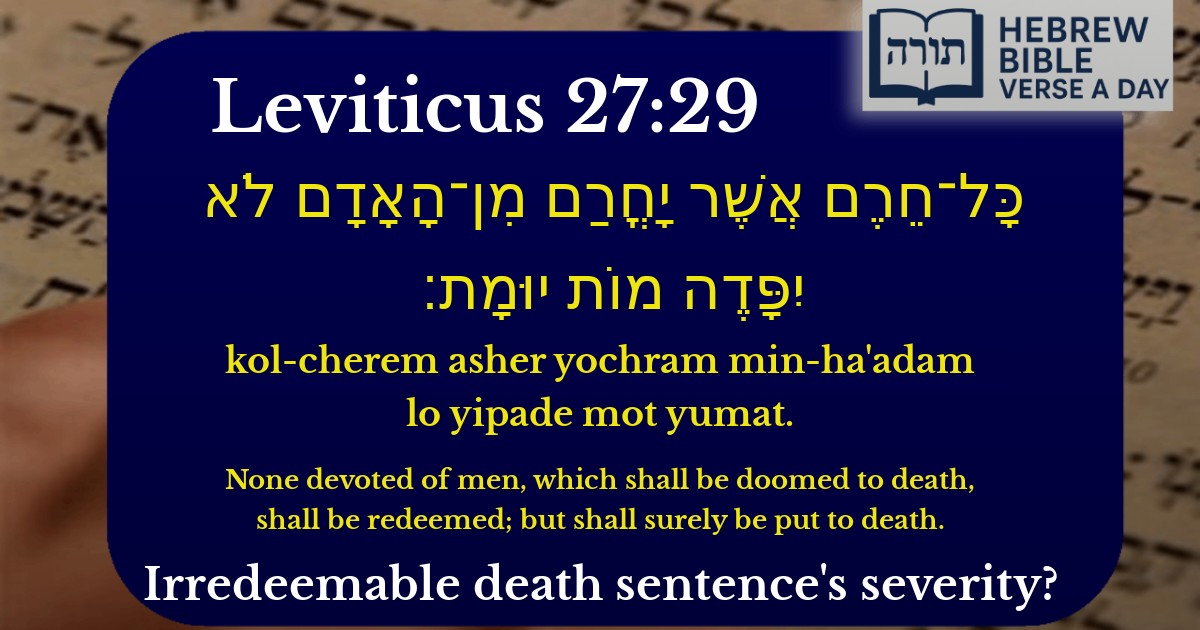Frequently Asked Questions
Q: What does Leviticus 27:29 mean?
A: Leviticus 27:29 discusses the concept of 'cherem' (חֵרֶם), which refers to something devoted or consecrated to Hashem in a way that it cannot be redeemed or exchanged. In this context, it specifically refers to individuals who have been sentenced to death due to severe sins (like idolatry or certain capital crimes). The verse teaches that such a person cannot be redeemed through payment or sacrifice—they must face the divinely ordained consequence.
Q: Why is the concept of 'cherem' important in Judaism?
A: The concept of 'cherem' highlights the severity of certain sins and the absolute sanctity of Hashem's judgment. According to Rashi and the Talmud (Sanhedrin 64a), 'cherem' in this verse refers to those guilty of idolatry or other capital offenses. It teaches that some actions are so grave that no atonement (like monetary compensation) is possible—only repentance and acceptance of divine justice can rectify the spiritual damage.
Q: Does Leviticus 27:29 apply today?
A: While the Torah's laws of 'cherem' and capital punishment were applicable when the Sanhedrin (Jewish high court) functioned with divine authority, today, without a Temple or Sanhedrin, these punishments are not carried out. However, the principle remains spiritually significant: certain sins (like idolatry) are so severe that they require sincere repentance (teshuvah) and commitment to avoid repeating them, as emphasized by Rambam in Hilchot Teshuvah.
Q: What can we learn from this verse about justice?
A: This verse teaches that true justice must be unwavering when dealing with severe moral breaches. The Talmud (Makkot 7a) explains that the Torah's strict stance here underscores the value of human life—capital punishment was only enacted with near-impossible standards of evidence to prevent misuse. The message is that justice must balance righteousness with mercy, but certain acts cannot be trivialized.
Q: How do traditional Jewish sources interpret 'cherem' in this verse?
A: Rashi explains that 'cherem' here refers to someone irrevocably condemned, such as the inhabitants of an idolatrous city (based on Deuteronomy 13:13-18). The Midrash (Sifra) adds that this teaches the gravity of leading others astray spiritually. Rambam (Hilchot Avodah Zarah 4:6) clarifies that such cases required meticulous legal scrutiny, emphasizing that Torah law prioritizes justice over haste.


Understanding the Concept of "Cherem" (חֵרֶם)
The verse (כָּל־חֵרֶם אֲשֶׁר יָחֳרַם מִן־הָאָדָם לֹא יִפָּדֶה מוֹת יוּמָת) discusses the severe status of cherem, a form of consecration or ban that renders something or someone irrevocably devoted to destruction. According to Rashi (on Leviticus 27:28), cherem refers to something utterly separated from human use and given over to Hashem, often in the context of war or idolatry. Once declared, it cannot be redeemed or spared.
Halachic Implications of Cherem
The Rambam (Hilchot Nedarim 2:16) explains that cherem is a form of vow with irreversible consequences. Unlike other consecrations, which can sometimes be redeemed with monetary compensation, a cherem designated for destruction—particularly in the context of idolaters or enemies of Israel—must be carried out without exception. The Talmud (Arachin 28b) reinforces this, stating that one who withholds a cherem violates a Torah prohibition.
Moral and Theological Dimensions
The Midrash (Sifrei Devarim 212) connects this concept to the severity of idolatry and rebellion against Hashem. When a person or group is placed under cherem, it signifies their complete moral corruption, leaving no room for repentance in this world. However, the Talmud (Sanhedrin 64a) also notes that cherem is a rare and extreme measure, emphasizing the gravity of such a decree.
Key Teachings from Orthodox Commentators